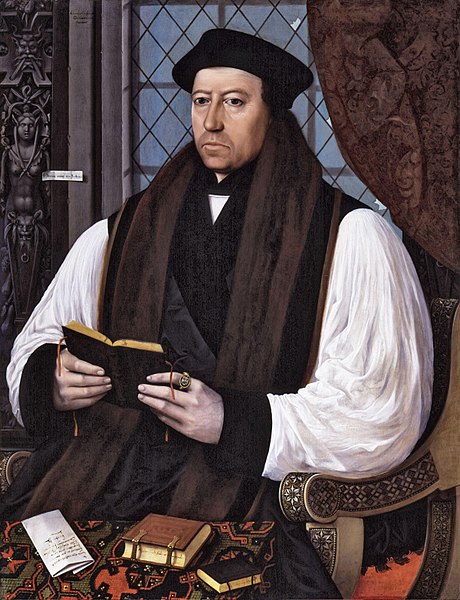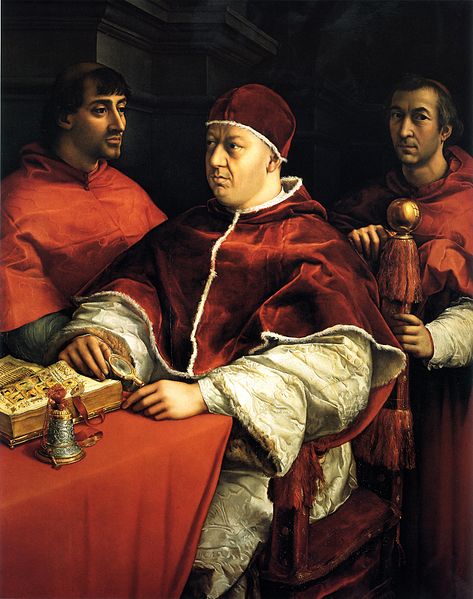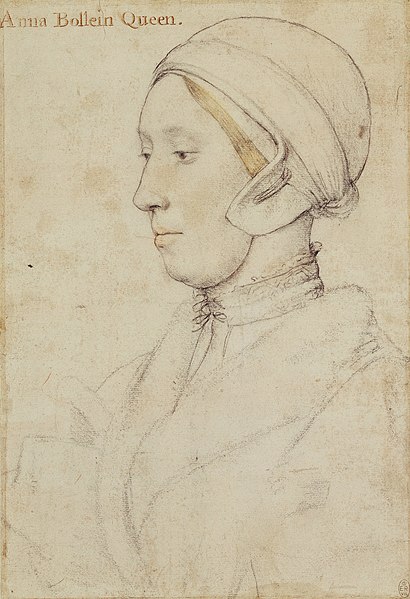 |
| Thomas Cranmer |
The Solution
It was
Stephen Gardiner[i]
who found the cleric with the solution to all Henry’s marital problems; Thomas Cranmer, proposed that the king’s case should be considered by the
doctors of divinity at the universities and not by Rome. The truth would be
found in the scriptures in divine law, not canon law. If the divines found in favour of
the king, then all that was needed was an official pronouncement by the Archbishop of Canterbury[ii]. Unsurprisingly Henry was taken by
this idea;
‘Marry, this man has the sow
by the right ear!’[iii]
The Boleyn
family were at the forefront of the espousal of Lutheranism; Eustace Chapuys[iv] wrote of Anne and Thomas;
‘Who are more Lutherans than
Luther himself.’[v]
Thomas and
Anne may have encouraged Henry to consider Cranmer’s stance that the ‘godly prince’ had a divine commission
to reform the church in his lands, whether the pope approved or no. Henry met
with Cranmer and ordered him to set all his work aside to concentrate on a
treatise expounding his opinions. Thomas was ordered to prepare accommodation
for Cranmer at his London home.
Seeing how
much Cranmer admired Anne, Thomas made much of this scholar who had lost his
chance of a career when he married a barmaid known as Black Joan. When Joan
died in childbirth Cranmer was readmitted to Cambridge University and he took holy orders. Now Cranmer was made Thomas’s chaplain.
Due to his
own folly Henry was politically isolated within Europe, and his disillusionment
with Rome was growing apace. The solution to divorce the church in England from
the church in Rome was becoming ever more appealing and would also be a
solution to his own personal divorce problem.
Embassy to Bologna
In February
1530 Henry sent Cranmer and Thomas, now Lord Keeper of the Privy Seal, as his ambassadors to the crowning
of Charles V as Holy Roman Emperor[vi] in Bologna. Thomas and Cranmer
were to impress on Charles that Henry only wanted a dissolution of his marriage
to Katherine
The embassy
was not a success; for once Thomas’s diplomatic skills deserted him; he was
provocative and made no secret of his ardent desire for reform in the church.
In any event Charles seems to have heard of Henry’s liaison with Mary,
undermining his alleged scruples;
‘His Majesty has
heard……….that the King had kept company with the sister of her whom he now
wanted to marry.’[ix]
 |
| Clement VII |
Storms at Home
In July 1530
the Lords temporal and spiritual in England, including Wolsey, sent a petition
to Clement beseeching him to find in Henry’s favour. Clement accused them of
troubling him over a little matter and pointed out that he had to take all
points of view into consideration, including those of the queen’s; he was being
pressed by Charles to find in favour of the emperor’s aunt. Charles pressed
Clement to order Henry’s separation from Anne; in this he was supported by the
disgraced Wolsey[x].
In November
1530 Wolsey wrote to Henry seeking the mitre and pall he had formerly used to
celebrate the divine office; Henry marvelled at Wolsey’s;
‘Brazen insolence………is there
still arrogance in this fellow who is so obviously ruined?’[xi]
By the 29th
Wolsey was dead and dishonoured; he died at Leicester obeying the king’s
summons to return to court. Henry was saddened by Wolsey’s death, although Anne
was jubilant at the passing of one of her greatest enemies.
.JPG/449px-Hans_Holbein_the_Younger_-_Thomas_Howard%2C_3rd_Duke_of_Norfolk_(Royal_Collection).JPG) |
| Duke of Norfolk |
Early in
1531 Chapuys reported to his master;
‘She [Anne] is becoming more
arrogant every day, using words in authority towards the king of which he has
several times complained to the Duke of Norfolk, saying that she was not like
the Queen who never in her life used ill words to him.’[xii]
Seeing the
problem as intractable as ever, and her youth passing her by, Anne was becoming
ever more desperate and accused Henry of keeping her waiting. Anne informed
Henry that she could have had a husband and children in the time she had waited
for him.
In January
1531 Anne and Henry had a violent quarrel; as ever, Anne threatened to leave
him. Henry was so worried that he turned to Thomas and her uncle Norfolk to
patch up matters between them. This time Anne was placated with gifts of furs
and rich embroideries. And this vicious cycle continued; Anne worrying that her
youth and beauty were fast disappearing, which resulted in the rows and then
the expensive making ups.
 |
| Chapter House, Westminster Abbey |
On 21st
January the Convocations of Canterbury and York met at Westminster. This
meeting marked the beginning of the English Reformation. The following month Henry stood up before parliament
and demanded that the Church of England recognise and acknowledge him as its ‘sole protector and supreme head.’
Parliament
and Convocation did not dare defy the king and on the 11th
Archbishop Warham announced that the clergy were ready to accept the king as
their head; ‘as far as the law of Christ
allows.’ Thomas offered to prove from the scriptures that;
‘When God left this world He
left no successor or vicar.’[xiii]
The nobility
supported their king and the man the Pope had named Defender of the Faith in October 1521 was to lead his country into
a break from Rome, but for many of the faithful it was not final.
The Fall of More
On 22nd March 1531 Chapuys wrote to
Charles V, reporting a conversation with Norfolk, wherein Norfolk mentioned the
unfortunate arrest of a Lutheran preacher who was liable to be burnt alive for
heresy. A number of nobles, including Norfolk and Thomas, were assigned to
question John Frith[xiv], who was later conducted before Henry. According to Chapuys Henry said
about Frith’s claim that the pope was not the sovereign chief of the Christian
church;
‘”This proposition cannot be counted as heretical,
for it is both true and certain.”’[xv]
 |
| Henry VIII |
Henry did not agree with all
Frith’s doctrines and released him on condition that Frith retract those
doctrines Henry did not consider orthodox.
By the late spring of 1532 Thomas
and Cromwell, amongst others were bullying the English bishops. On 15th
May they made their submission to the king; to Chancellor More, faithful to the
doctrines of the Catholic church, Henry’s actions seemed like tyranny.
‘[Norfolk] by importunate suit had at length of the
King obtained for Sir Thomas More a clear discharge of his office………..and then at a time convenient by his highness’s
appointment repaired he [More] to his Grace to yield up unto him the Great
Seal.’[xvi]
The following day More delivered
the Great Seal of his office to Henry, who promptly gave it to Thomas Audeley. With
More’s resignation the Catholic church lost its last advocate in government for
the eradication of heresy by fire and the anti-heresy campaign and burnings
that More had been so energetic in supporting, died away.
More’s
End
I
n March 1533 Erasmus[xvii], looking for a new patron following the fall of
More, dedicated his book on the Apostles’ Creed to Thomas, whom he called ‘outstandingly learned’. The
following January Erasmus again dedicated a book to Thomas; ‘On Preparation for Death’. In the
appendix Erasmus published More’s last two letters to him.
 |
| Erasmus |
By now Thomas was accusing More
of taking bribes during his time as chancellor. On 13th April 1534, More was asked to
appear before a commission and swear his allegiance to the parliamentary Act
of Succession; he
refused. On 17th Henry committed More to the Tower.
It was not until 6th
July 1535, following a trial at which George Boleyn was one of the
Commissioners, that More paid the ultimate price for opposing his king. The
trial had never intended to prove his innocence. More was executed, saying on
the scaffold;
‘"I pray you, Mr
Lieutenant, see me safe up and for my coming down, I can shift for myself…….[I
am} the king's good servant, but God's first."’[xviii]
Long Live the Queen
 |
| Anne Boleyn |
By January
1533 Henry knew that Anne was pregnant and to ensure the legitimacy of his
heir, he married Anne in a secret ceremony on 25th January. Thomas
and his countess, George and two others were witnesses to the marriage held in
York Place. It was some weeks later that the new archbishop of Canterbury,
Thomas Cranmer[xix],
announced the marriage between Henry and Katherine was null and void.
Norfolk and
Suffolk were given the task of informing the king’s first wife of the change in
her status, telling Katherine that;
‘She need not trouble
anymore about the King, for he had taken another wife and that, in the future,
she must abandon the title of Queen and be called the
“Princess-Dowager”………...she could hardly expect the King to support her and her
household.’[xx]
Henry was
already showing evidence of his inclination to treat discarded wives shabbily.
Thomas More
refused to attend Anne’s coronation as queen held on 1st June. Anne
had finally given in to Henry’s desires, at the latest, by the previous autumn
when Henry and François met at Calais. There Anne and Henry had connecting
bedchambers. Mary’s future second husband William Stafford was in the king’s entourage as Mary
was in her sister’s.
Thomas seems
to have had a very different reaction to his younger daughter’s affair with the
king; after all Anne was likely to achieve what Mary signally had not tried
playing for; the chance to be queen. Elizabeth Boleyn was part of her
daughter’s entourage throughout the remainder of her life.
Bibliography
Thomas
Cromwell – Robert Hutchinson, Phoenix 2008
Henry VIII –
Robert Lacey, George Weidenfeld & Nicholson & Book Club Associates 1992
The Earlier
Tudors – JD Mackie, Oxford University Press 1992
Thomas More
– Richard Marius, Weidenfeld & Nicholson 1993
Mary Tudor –
HFM Prescott, Phoenix 2003
Rivals in
Power – David Starkey (ed), Toucan Books 1990
Elizabeth –
David Starkey, Chatto & Windus 2000
The Lisle
Letters – Muriel St Clare Byrne (ed), Penguin Books Ltd 1985 1533
The Six
Wives of Henry VIII – Alison Weir, Pimlico 1992
Mary Boleyn
– Alison Weir, AudioGO Ltd 2012
www.wikipedia.en
[i]
Later Mary’s Lord Chancellor
[iii]
The Six Wives of Henry VIII - Weir
[iv]
A secretary of Henry’s, Sir
William Paget, held that Chapuys was a liar who had no regard for honesty
or truth
[v]
Thomas More - Marius
[vi]
All Holy Roman Emperors had to be invested by the pope
[vii]
Popular opinion was in favour of Katherine and Anne was deeply disliked
[viii]
The Six Wives of Henry VIII - Weir
[ix]
Mary Boleyn - Weir
[x]
Chapuys thought that Wolsey believed that once the ‘great matter’ was resolved in Katherine’s favour that Wolsey would
return to power
[xi]
Thomas Cromwell – Hutchinson
[xii]
The Six Wives of Henry VIII - Weir
[xiii]
Ibid
[xiv]
Frith was burnt at the stake as a heretic on 23rd June 1533, one
week before Henry’s excommunication
[xv]
Thomas More - Marius
[xvi]
Ibid
[xvii]
One of the leading scholars of the period
[xix]
Appointed 1st October 1532 and approved in Rome in February 1533
[xx]
Henry VIII - Lacey
No comments:
Post a Comment
Note: only a member of this blog may post a comment.